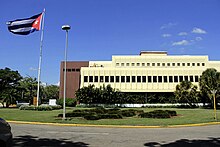Center for Genetic Engineering and Biotechnology
 Offices of the CIGB | |
| Research institute overview | |
|---|---|
| Formed | July 1, 1985 |
| Jurisdiction | |
| Headquarters | Avenida 31 No. 15802, Havana, Cuba 23°04′26″N 82°27′08″W / 23.0738°N 82.4523°W |
| Website | www |
The Center for Genetic Engineering and Biotechnology (Spanish: Centro de Ingeniería Genética y Biotecnología, CIGB) is a research institute in Havana, Cuba.
Founding
In 1982, the United Nations Industrial Development Organization (UNIDO) offered grant funding via a competitive application process to facilitate biotechnology development in the Third World.[1]: 132 Cuba sought, but did not receive funding, which instead was awarded to a joint project proposed by India and Italy.[1]: 132 Cuba nonetheless proceeded with the development of a biotechnology research institution using its own funds, CIGB.[1]: 132
Activity
In 2006, CIGB developed the
As of 2017, CIGB had 1,600 employees and sold 21 products internationally.[1]: 138
As of 2020, CIGB had two joint ventures with China.[1]: 143
It is responsible for creating the Abdala vaccine.[3][4][5]
The Centre developed the COVID-19 vaccine Mambisa, which is in the final stages of clinical trials.[6]
See also
References
- ^ ISBN 978-0-300-23003-1.
- ^ a b "UA Health Sciences Researchers Look to Collaborate With Cuba on Diabetic Wound Therapy | Department of Medicine". deptmedicine.arizona.edu. Retrieved 2023-12-27.
- ^ "Cuba's COVID vaccine rivals BioNTech-Pfizer, Moderna". DW.COM. 2021-06-27. Retrieved 2021-06-28.
- ^ "ABDALA Clinical Study - Phase III". rpcec.sld.cu. Registro Público Cubano de Ensayos Clínicos. Archived from the original on 2021-03-20. Retrieved March 22, 2021.
- ^ "ABDALA Clinical Study". rpcec.sld.cu. Registro Público Cubano de Ensayos Clínicos. Archived from the original on 2021-01-22. Retrieved March 22, 2021.
- ^ Sánchez, Liz Conde (7 April 2022). "How is Mambisa progressing on the road to authorization as an anti-COVID-19 vaccine?". en.granma.cu. Retrieved 6 May 2022.
External links
